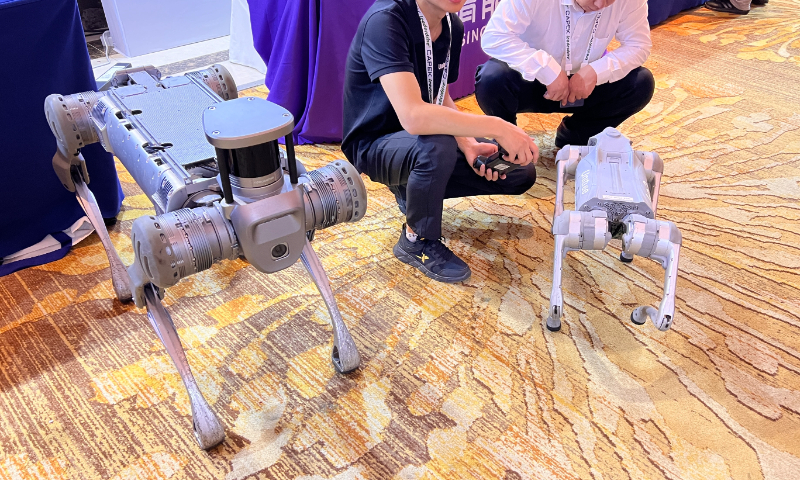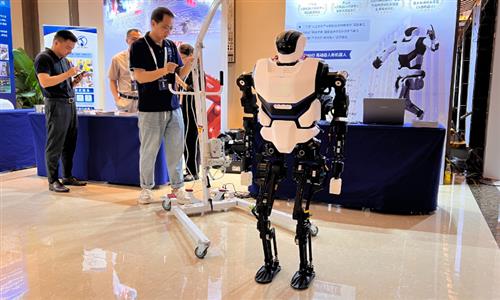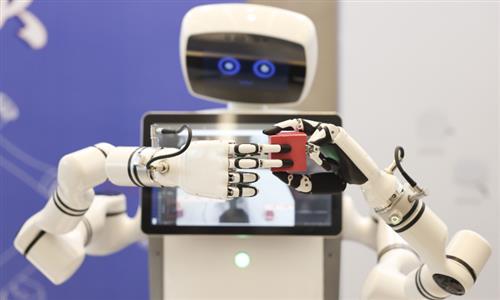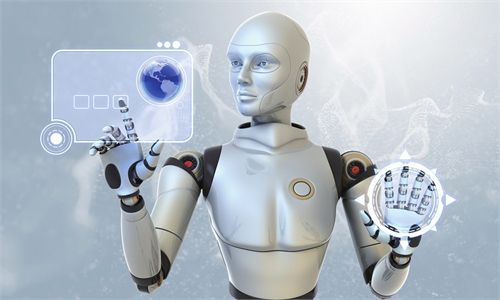
B2 and Go2 quadruped robots of Hangzhou-based Unitree Robotics Photo: Leng Shumei/GT
China has an opportunity to spur development amid the current wave of new artificial intelligence (AI) technology across the world, Li Yaping, president of the China Association for Mechatronics Technology and Application, told the Global Times in Wuhu, East China's Anhui Province during the 14th China International Robot Summit Forum and the 10th Capek Award Ceremony, which concluded on Friday.
China has independent industrial chain and domestically developed technologies. It is impossible that the US can contain China's AI technology development by so-called decoupling, Li said.
China is already the largest industrial robot market in the world. It accounted for 52 percent of robot installations worldwide in 2022, giving Chinese robot producers a key advantage in their home market, according to data from the International Federation of Robotics (IFR).
During the three-day forum, more than 600 top experts and executives in the field of intelligent manufacturing gathered in Wuhu, showcasing China's advanced robotic products and discussing the infinite possibilities for the future development of the industry.
Among the products displayed at the forum were China-developed quadruped robots, or robotic dogs, which have caught the foreign media's attention recently.
"So cute, providing much emotional value, and also very light, I can even pick it up," said one young lady while admiring the Go2 quadruped robot from Hangzhou-based Unitree Robotics.
Go2 can perform actions like jumping, sitting, and lying down, just like a pet dog, charming everyone.
The company said Go2 is a consumer-grade robot dog weighing about 15 kilograms. Thanks to powerful language capabilities, it can fully understand an owner's intentions and understand the environment by combining sensor information.
Another Unitree product, the B2 robot dog, appeared more sturdy. A member of staff stood on a B2 robotic dog's back and the dog carried him steadily forward.
According to the company, a B2 robotic dog can carry a maximum weight of 120 kilograms.
Li Yibin, a professor at the Robotics Research Center of Shandong University, told the Global Times that compared to humanoid robots, quadruped robots have greater balance and are more suitable for outdoor and complex terrain environments.
The application of AI large models and learning technology in recent years has greatly improved the performance of quadruped robots.
In addition to the outdoors, robot dogs have a wide range of applications in industrial scenarios.
"Go2 can be used for home companionship and also in factories for patrols and inspections," Chen Li, co-founder of Unitree Robotics, told the Global Times.
Large robotic dogs like B2 are currently mainly used in the oil, chemical, coal, and power industries for patrols and inspections as well as checking equipment, according to Chen.
Some media reports have compared China's robot dogs with Spot, a quadruped robot from the US company Boston Dynamics.
In response, Chen said that in terms of cost-effectiveness, China's robot dogs are actually better than Spot.
Looking at the current development status of robots, especially quadruped robots, it is very likely that in the future, the US will reduce investment in hardware and instead focus on software development, similar to the current situation in the drone industry, according to Chen.
Li has a more distant vision for the development of quadruped robots. "Electricity is the future trend of development. After that, perhaps we can develop bionic power, just like human muscles," Li noted.



